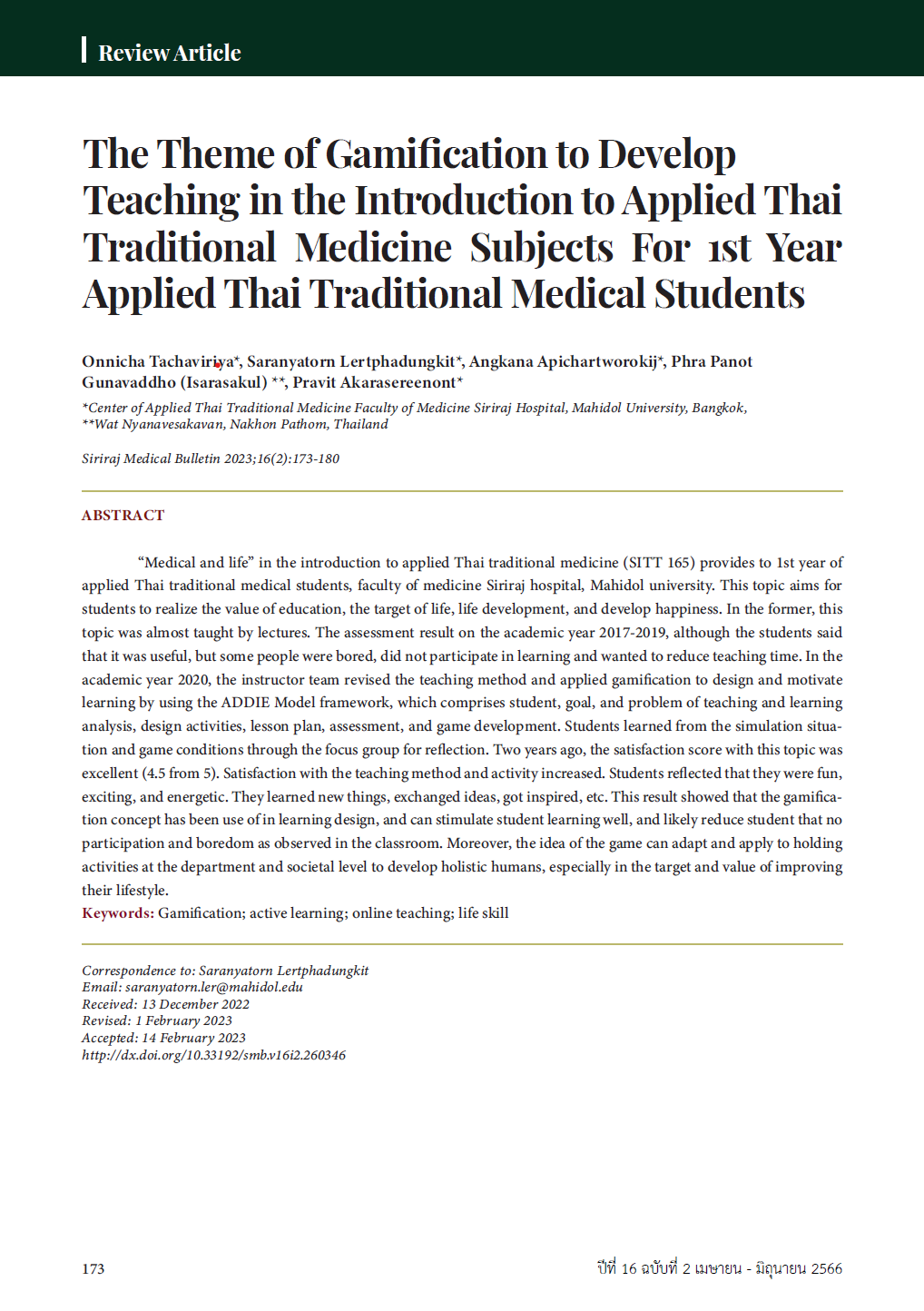The Theme of Gamification to Develop Teaching in the Introduction to Applied Thai Traditional Medicine Subjects For 1st Year Applied Thai Traditional Medical Students
Main Article Content
Abstract
“Medical and life” in the introduction to applied Thai traditional medicine (SITT 165) provides to 1st year of applied Thai traditional medical students, faculty of medicine Siriraj hospital, Mahidol university. This topic aims for students to realize the value of education, the target of life, life development, and develop happiness. In the former, this topic was almost taught by lectures. The assessment result on the academic year 2017-2019, although the students said that it was useful, but some people were bored, did not participate in learning and wanted to reduce teaching time. In the academic year 2020, the instructor team revised the teaching method and applied gamification to design and motivate learning by using the ADDIE Model framework, which comprises student, goal, and problem of teaching and learning analysis, design activities, lesson plan, assessment, and game development. Students learned from the simulation situation and game conditions through the focus group for reflection. Two years ago, the satisfaction score with this topic was excellent (4.5 from 5). Satisfaction with the teaching method and activity increased. Students reflected that they were fun, exciting, and energetic. They learned new things, exchanged ideas, got inspired, etc. This result showed that the gamification concept has been use of in learning design, and can stimulate student learning well, and likely reduce student that no participation and boredom as observed in the classroom. Moreover, the idea of the game can adapt and apply to holding activities at the department and societal level to develop holistic humans, especially in the target and value of improving their lifestyle.
Article Details

This work is licensed under a Creative Commons Attribution-NonCommercial-NoDerivatives 4.0 International License.
References
พระพรหมคุณาภรณ์ (ป. อ. ปยุตฺโต). การศึกษาทั่วไปเพื่อสร้างบัณฑิต. พิมพ์ครั้งที่ 5. กรุงเทพฯ: ศุภวนิชการพิมพ์; 2559
Shek DT, Lin L, Ma C, Yu L, Leung JT, Wu FK, Leung H, Dou D. Perceptions of adolescents, teachers and parents of life skills education and life skills in high school students in Hong Kong. Applied Research in Quality of Life. 2021 Oct;16(5):1847-60.
เบญจภัค จงหมื่นไวย์, กริช กองศรีมา, แสงเพ็ชร พระฉาย, สายสุนีย์ จับโจร, อรัญ ซุยกระเดื่อง. เกมมิฟิเคชันเพื่อการเรียนรู้. วารสารโครงงานวิทยาการคอมพิวเตอร์และเทคโนโลยีสารสนเทศ 2561;4:34-43.
ADDIE model diagram by Steven J. McGriff, Instructional Systems, College of Education, Penn State University 2000.
Bejtkovský J. The Current Generations: The Baby Boomers, X, Y and Z in the Context of Human Capital Management of the 21st Century in Selected Corporations in the Czech Republic. Littera Scripta. 2016;9(2):25-45.
Törőcsik M, Szűcs K, Kehl D. How generations think: research on Generation Z. Acta universitatis Sapientiae, communicatio. 2014;1(2014):23-45.
Graffam B. Active learning in medical education: Strategies for beginning implementation. Medical Teacher. 2007;29(1):38-42
Murillo-Zamorano LR, López Sánchez JÁ, Godoy-Caballero AL, Bueno Muñoz C. Gamification and active learning in higher education: is it possible to match digital society, academia and students' interests? International Journal of Educational Technology in Higher Education. 2021;18(1):15.






